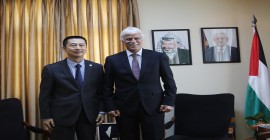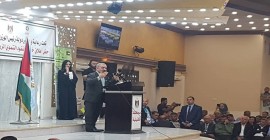Shtayyeh: Differences in Donors Priorities Limited our Ability to Development
Translated by Sabrin Qadah
Shtayyeh explained that the aids Palestine received, which are estimated $ 2.5 billion during the first five years after Oslo, came on a five-year political basis calling for an end of the occupation in 4/5/1999. However, this hypothesis is no longer standing in spite of the continuing flow of donor funds without creating new hypotheses that take into account the Palestinian priorities; limiting the ability of these funds to make development.
This came during a seminar attended by representatives from about 30 countries and donors, organized by the Office of International Aid Coordination (LAX) in Ramallah today.
Shtayyeh explained it is possible to determine the impact of donor funds on development through, for example, answering the question: Have funds really limited unemployment and poverty? Therefore, he saw that donor priorities sometimes do not chime with the priorities of the National Authority.
He clarified that the Palestinian development priorities are represented in several axes: first comes Jerusalem, supporting the steadfastness of its people and linking it to the Palestinian economy. The second axis is the Palestinian Valleys, which constitutes 28% of the West Bank and are Palestine’s vegetable basket. Third, the areas classified as "C", which constitute 60% of the West Bank. Fourth, the Gaza strip, which must be given priority to development not only in reconstruction but also in enabling economy to function in a way that makes it able to provide jobs for tens of thousands of unemployed people.
He added: one of the lessons learned from the Palestinian experience in institution building is the necessity to work on the integration of institutions that can sometimes be conflicting with each other, adding that the missions are supposed to be distributed among the institutions in terms of planning, implementation and supervision.
Shtayyeh said that international donors have asked the experience of the Palestinian Economic Council for Development and Reconstruction "PECDAR" to be applied in countries such as Syria, Iraq, Yemen and Libya away from bureaucratic governments.
He said that "PECDAR" was founded in the early emergence of the Palestinian Authority to carry the burden of development, noting that it is a national institution that its work continued at the same pace and crew in all the Palestinian territories despite the division.





